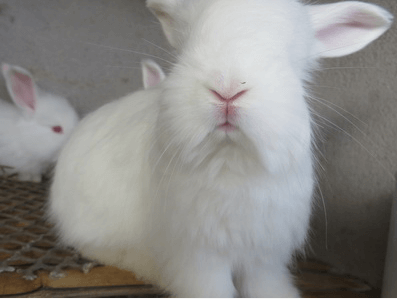a、夜食性:
a. Night eating habits:
家兔具有昼静夜动的特点。白天无精打采,闭目养神,采食量很少;夜间精神旺盛,采食、饮水增加,约占全日的70%以上。因此在晚上要喂足草料,饮足水,有条件的饲养户可在深夜加喂一次。
Rabbits have the characteristics of day rest and night movement. Listless during the day, close your eyes and rest, and eat very little; Energetic at night, food and water intake increased, accounting for more than 70% of the whole day. Therefore, feed enough forage and drink enough water in the evening. Conditional breeders can feed it once at night.
b、嗜眠性:
b. Narcolepsy:
家兔在白天常闭目养神,呈静伏或睡眠状态。这时除听觉外其他刺激不易引起兴奋。根据这一习性,饲养员在保证正常喂料、饮水及日常管理工作外,应保持兔舍及周围环境的安静,白天尽量不要妨碍家兔睡眠。
Rabbits often close their eyes and rest during the day, in a state of quiet or sleep. At this time, in addition to hearing, other stimuli are not easy to cause excitement. According to this habit, in addition to ensuring normal feeding, drinking water and daily management, the breeder should keep the rabbit house and the surrounding environment quiet, and try not to interfere with the rabbit's sleep during the day.
c、胆小性:
c. Timidity:
兔系胆小动物,遇有敌害时,能借助敏锐的听觉作出判断。突然的声响、生人或陌生的动物,如猫、等都会使家兔惊恐不安,并影响周围家兔。因此在饲养管理中,动作要尽量轻稳,同是防止生人或其他动物进入兔舍。
Rabbits are timid animals. In case of enemies, they can make judgments with the help of keen hearing. Sudden noise, strangers or strange animals, such as cats and dogs, will frighten rabbits and affect surrounding rabbits. Therefore, in the feeding and management, the action should be as light and stable as possible to prevent strangers or other animals from entering the rabbit house.
d、喜洁性:
d. Cleanliness:
家兔喜爱清洁干燥的生活环境。潮湿污秽的环境,易造成家兔传染病的寄生虫的蔓延。所以在兔舍设计及日常管理中,要保证圈舍清洁干燥,冬暖夏凉,通风良好。

Rabbits like a clean and dry living environment. The damp and dirty environment is easy to cause the spread of parasites of infectious diseases in rabbits. Therefore, in the rabbit house design and daily management, it is necessary to ensure that the enclosure is clean and dry, warm in winter and cool in summer, and well ventilated.
e、独居性:
e. Solitude:
家兔虽有群体,但很差。群养时不论公、母及同性别的成年兔经常发生互相争斗现象,特别以公兔为甚。对新购进的更要引起注意。因此,成年兔要单笼饲养。
Although there are groups of rabbits, they are very poor. In group rearing, adult rabbits of male, female and same sex often fight with each other, especially male rabbits. We should pay more attention to new purchases. Therefore, adult rabbits should be raised in a single cage.
f、啃咬性:
f. Bitability:
家兔的对门齿是恒齿,出生时就有,永不脱换,而且不断生长。家兔必须借助采食和啃咬硬物,不断磨损,才能保持其上下门齿的正常咬合。因此,在养兔中要注意笼舍的建设,尽量使用家兔不爱啃咬的材料,以便延长兔笼的使用年限。另外要经常给兔提供磨牙的条件,如把复合饲料加工成硬质颗粒饲料,或者在笼舍内多投放树枝或木棒供兔啃咬,以利门齿的磨蚀,促进饲料的咀嚼和消化。
The first pair of incisors of rabbits are permanent teeth. They exist at birth, never change, and continue to grow. Rabbits must eat and bite hard objects and wear constantly in order to maintain the normal occlusion of their upper and lower incisors. Therefore, in raising rabbits, we should pay attention to the construction of cages and try to use materials that rabbits do not like to bite, so as to prolong the service life of rabbit cages. In addition, we should often provide rabbits with molar conditions, such as processing compound feed into hard pellet feed, or putting more branches or sticks in the cage for rabbits to bite, so as to facilitate the abrasion of incisors and promote the chewing and digestion of feed.
g、穴居性:
g. Burrowing:
穴居性是指家兔具有打洞并在洞内产仔穴居的本能行为。这一习性,对现代化养兔生产来说无法利用。不过在笼养的情况下,需要给繁殖母兔建好产仔箱或窝,让母兔在箱(窝)内产仔。但是在建筑兔舍时,必须考虑到家兔的穴居性,以兔由于选材不当或设计不合理,致使有兔在舍内打洞造穴,给饲养管理带来困难。
Burrowing refers to the instinctive behavior of rabbits to burrow and give birth in the cave. This habit cannot be used for modern rabbit production. However, in the case of captive breeding, it is necessary to build a litter box or nest for the breeding female rabbit to give birth in the box (nest). However, when building a rabbit house, we must consider the burrowing nature of rabbits. Due to improper material selection or unreasonable design, rabbits make holes in the house, which brings difficulties to feeding and management.
h、食粪性:
h. Fecal eating:
家兔的食粪性是指家兔吃自己部分粪便的本能行为。这属正常的生理现象,对家兔有益。通常家兔排出两种粪便,一种是粒状的硬粪,在白天排出。一种是团状的软粪,在夜间排出。家兔排出的软粪时会自然弓腰用嘴从肛门处吃掉,稍加咀嚼便吞咽,每天所排的软粪全部被自己吃掉,只有当家兔生病时才停止食粪。所以在管理上要注意观察舍内是否有软粪,如发现软粪,应及时对家兔进行健康检查,做到有病早治,减少损失。
Fecal feeding of rabbits refers to the instinctive behavior of rabbits to eat part of their own feces. This is a normal physiological phenomenon and is beneficial to rabbits. Usually, rabbits excrete two kinds of feces, one is granular hard feces, which is excreted during the day. One is a mass of soft feces, which is discharged at night. The soft feces discharged by the rabbit will naturally bow down and eat from the anus with his mouth. After a little chewing, he will swallow. All the soft feces discharged every day will be eaten by himself. He will stop eating feces only when the rabbit is ill. Therefore, in terms of management, we should pay attention to observe whether there is soft feces in the house. If soft feces are found, we should carry out health examination on rabbits in time to achieve early treatment and reduce losses.


 发布日期:2021-11-15
来源:http://www.myxinhua.com 发布人:admin
发布日期:2021-11-15
来源:http://www.myxinhua.com 发布人:admin